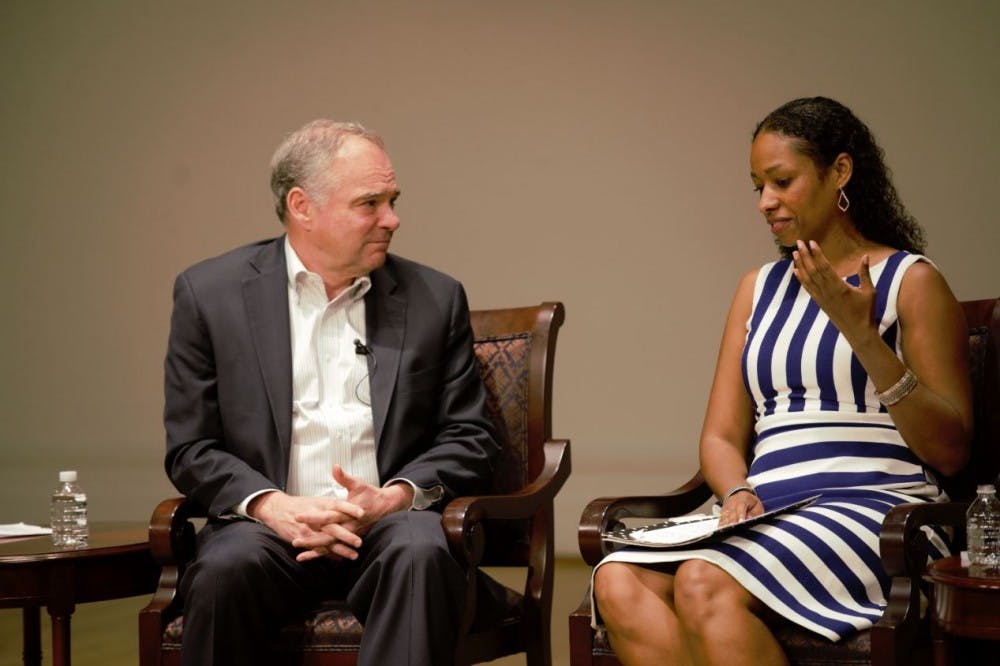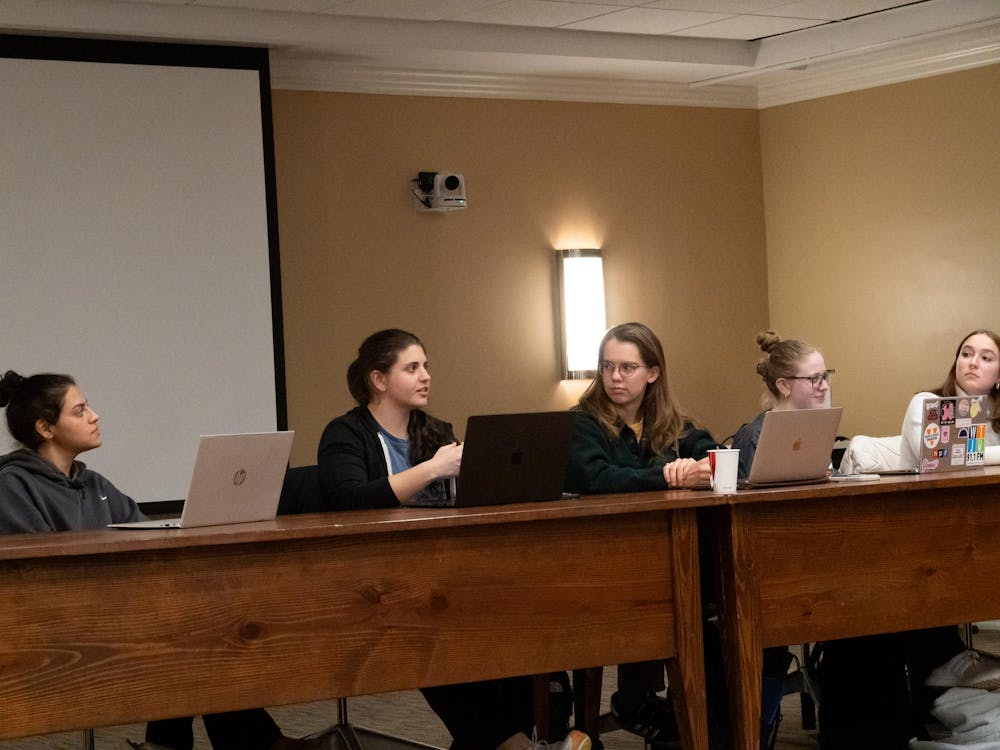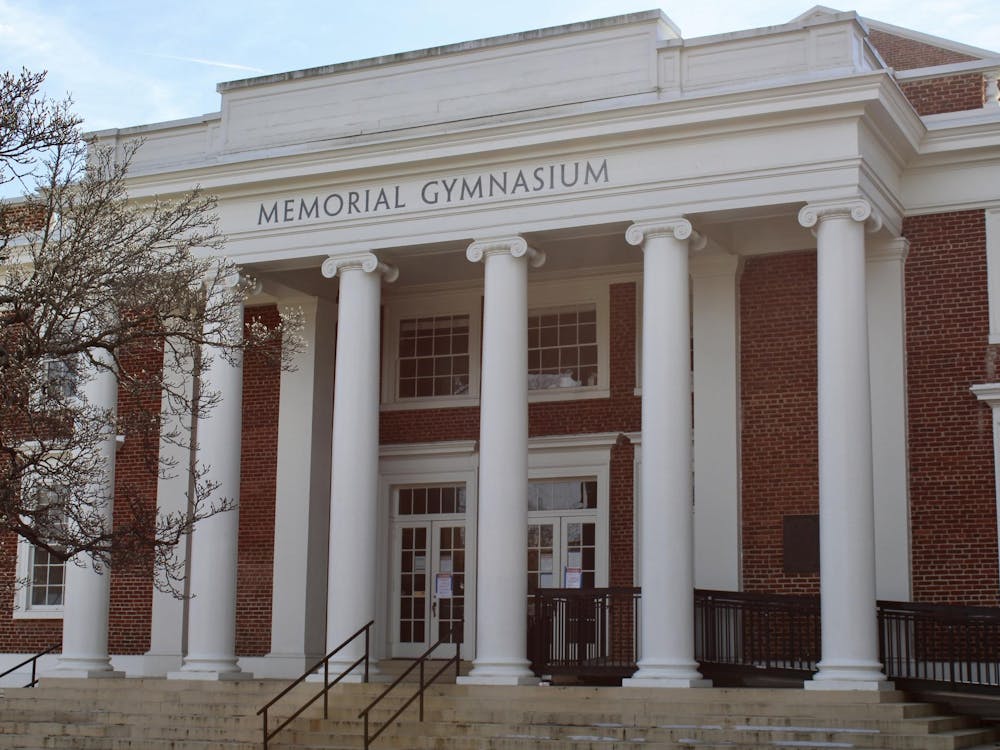The University’s Miller Center of Public Affairs hosted U.S. Sen. Tim Kaine at Old Cabell Hall Friday for a panel discussion centered around the interaction between religion and public life in the U.S. In particular, Kaine discussed how his own experience with spirituality has shaped his career in politics and his approach to legislating in today’s politically polarized climate.
The event was co-sponsored by the Contemplative Sciences Center, Department of Religious Studies and the Virginia Center for the Study of Religion, as well as the Miller Center.
The panel was comprised of faculty members with a wide range of experience and specializations — including David Germano, a religious studies professor and executive director of the Contemplative Sciences Center, Larycia Hawkins, a visiting professor in the politics department, and Charles Mathewes, an assistant religious studies professor and director of the Virginia Center for the Study of Religion.
Kaine spoke extensively on his Irish-Catholic upbringing in Kansas City, Mo., and the central role faith has played both in his personal life and his later career in government. Kaine described the volunteer work he did with impoverished communities in Honduras with the Jesuit missionaries while at Harvard Law School as particularly seminal in his personal development.
“By the time I got back from Honduras, I was a very changed person,” Kaine said. “In a way, that was the transition for me from a personal spirituality of doing what my parents did to a personal spirituality that was very much about action.”
In addition to describing his own spiritual journey, Kaine also spoke openly about his views on how religion and public life ought to intersect, especially the importance of sharing motivations.
“There’s many different motivations that drive us in doing what we do,” Kaine said. “The way I try to sort of square the role of religion or faith in public life is to view it as a sharing of my motivations in the hopes that if I share, others will share with me — and if they share with me, then I’ll be a better person and maybe be a better public servant too.”
During the panel-led discussion, Kaine and the panelists engaged in dialogue regarding the connection between his career in government and religious values.
In particular, Hawkins cited the senator’s references to listening and sharing motivations in relation to the white supremacist demonstrations of Aug. 11 and 12, 2017, in Charlottesville and at the University. Hawkins asked Kaine what could be done to reconcile the senator’s methods with the hateful viewpoints expressed by the white supremacist demonstrators in terms of listening to such openly racist perspectives.
“Look, I’ve never in my life ever been treated badly and wondered if it was because of the color of my skin or because I was a man,” Kaine said. “[Or] it’s not because of some endemic quality to me that I cannot change, so it's easy for me to say, ‘Listen to events of speech.’”
However, Kaine added that listening as part of an active dialogue with others is essential when the outcome of such discussion is positive change rather than mere disagreement.
“I do believe listening is a precursor to action,” Kaine said. “Listening can be a palliative.”
With regards to contemporary race relations in the U.S. and in the context of Charlottesville, Kaine said the most pressing racial disparities were defined by ongoing income and wealth inequality between whites and communities of color.
“If for seven-eighths of your entire history here on the continent, you were held either in bondage or second-class, subjected status, we've got a long way to go,” Kaine said. “I think the real issue for Charlottesville and Richmond and the nation are in the kind of wealth and income category and meaningful, powerful steps to promote [higher] wages for African-Americans and other immigrant communities.”
Kaine further discussed ways in which religion can be used to bridge the partisan divide in modern American politics. More specifically, Kaine cited his own personal experience of attending weekly Senate prayer breakfasts — involving both Democrats and Republicans — as an important means of reaching across the aisle and setting aside political differences.
“I would say that it is a binding experience with my colleagues — again, who I often disagree with,” Kaine said. “At one point, one of my colleagues said, ‘It’s really hard to stab somebody in the back when you’ve been at the prayer breakfast with them.” He added as a joke, “‘But it’s not impossible.’”
With reference to the recent death of Sen. John McCain, Kaine took time to express his great respect for the late legislator.
“McCain was a really irascible guy that would fight you non-stop,” Kaine said. “McCain was better at saying, ‘Man, I’ve made a big mistake, and I’m sorry — I really do apologize.’ He was better at that than virtually anybody I’ve ever known.”
In response to an audience-submitted question asking if he would consider a run for the presidency in 2020, Kaine gave no definite answer, but instead reflected on his previous candidacy for vice president in 2016 with running mate Hillary Clinton.
“I’ll be very candid — it was an amazing experience to be on the national ticket with Hillary Clinton, who I think would have been a superb president,” Kaine said. “But we lost, and it’s not the first time in life something I really hoped would happen didn’t … I did have a feeling — a little bit — of coming back after being on the ticket, and feeling there's no place like home, [and] Virginia and Virginia politics suddenly looked really great compared to the big league.”
Kaine is running for re-election this November against Republican candidate Corey Stewart.
Friday’s talk was the first public event in the College of Arts and Sciences’ Democracy Initiative — a joint partnership between the College and the Miller Center that seeks to examine current issues facing democracy, both in the U.S. and worldwide. The program is further divided into “democracy labs,” including Kaine’s address, that are meant to bring together graduate and undergraduate students and faculty together in relation to relevant issues.






